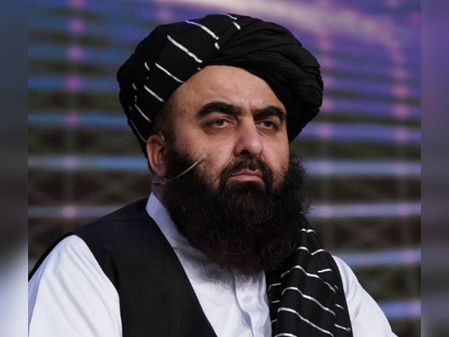
New Delhi – The Indian government on Saturday denied any role in organizing the controversial press conference held by Afghanistan’s Foreign Minister Amir Khan Muttaqi in New Delhi, which sparked outrage after women journalists were excluded from the event.
The Ministry of External Affairs (MEA) clarified that the invitations to the press briefing were sent directly by the Afghan Consulate in Mumbai to select Delhi-based journalists. The MEA further noted that the event was conducted within the premises of the Afghan Embassy, which lies outside the jurisdiction of the Indian government, NDTV reported quoting MEA sources.
The press conference, held on Friday at 3:30 p.m. at the Afghan Embassy, was reportedly attended only by a small group of journalists — none of them women. Several reports alleged that female reporters were explicitly prevented from attending, despite following the prescribed dress code.
The exclusion triggered widespread condemnation from journalists, media bodies, and opposition leaders.
Congress leader Priyanka Gandhi Vadra criticized the incident, urging Prime Minister Narendra Modi to state his position. “This is an insult to some of India’s most capable women in a nation where women are considered the backbone and pride of the country,” she said.
The controversy also ignited a social media backlash, with many users condemning the perceived legitimization of the Taliban’s gender-discriminatory practices on Indian soil.
Muttaqi, who arrived in New Delhi on Thursday, met External Affairs Minister S. Jaishankar earlier during his visit to discuss bilateral cooperation, trade, development aid, and people-to-people ties. Notably, India recently upgraded its Technical Mission in Kabul to Embassy status, signaling a cautious diplomatic engagement with the Taliban.
However, the restricted press interaction — attended by only 15–16 journalists — has raised further questions about transparency and selective media access.
According to reports, Ikramuddin Kamil, the Taliban-appointed head of the Afghan Consulate in Mumbai, personally contacted a few journalists by phone to issue informal invitations. Several women journalists have since expressed frustration and anger over being deliberately excluded.
The Afghan Embassy in Delhi continues to be run by officials from the former Ashraf Ghani administration, while the Taliban controls the consulates in Mumbai and Hyderabad.
Media observers have criticised the selective outreach, calling it “undemocratic” and arguing that such restricted access undermines public accountability and prevents scrutiny of India’s evolving engagement with the Taliban regime.
The Taliban government in Afghanistan has long faced international condemnation for its severe restrictions on women — including bans on education, employment, and authorship. Recently, it reportedly prohibited books by female authors in universities and dropped 18 academic courses, among them Gender and Development, Human Rights, and Afghan Constitutional Law.
With inputs from IANS